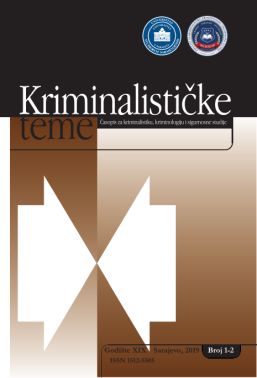NAČINI IZRAŽAVANJA MIŠLJENJA O IZVRŠENOM VJEŠTAČENJU U KRIMINALISTIČKOJ RUKOPISNOJ IDENTIFIKACIJI
METHOD OF EXPRESSING OPINIONS IN FORENSIC HANDWRITING IDENTIFICATION
Author(s): Muamer Kavazović, Dina Bajraktarević Pajević, Marija Lučić-ĆatićSubject(s): Methodology and research technology, Criminology
Published by: Fakultet za kriminalistiku, kriminologiju i sigurnosne studije Univerziteta u Sarajevu
Keywords: Forensic Handwriting identification; Method of expressing opinion; probability; opinion levels;
Summary/Abstract: The inspiration for the paper and the problem(s) that the paper addresses: Thematically and structurally, this work was inspired by desire of the author to show the necessary way of expressing an opinion in Forensic Handwriting identification and to compare ours experiences with international practice. The goals of the paper (scientific and/or social): To show ways of expressing an opinion in Forensic Handwriting identification in our country, and in some other countries which experiences and practices could be of interest to our professional and scientific public. Methodology/Design: Elementary methods used during this study are: content analysis, method of description, classification and specialization, comparative and historical method. Research/the paper limitations: The work has theoretical character and there are no more important limitations. Results/findings: When we are talking about practical work within forensic handwriting identification field, it is necessary to mention the possibility to present results of expertise with a certain level of probability. In practice of other countries that are mentioned in this paper, it is noticeable that they are all using pretty much similar fundamental points for this problem. Countries that we decided to use for comparison purposes are using less detailed (Netherlands and USA) or more detailed (Germany) probability levels, when presenting the results, than we do, in our country. In the future, it will be important to follow movements within practice in Germany, considering their striving to present results of performed expertise without absolute certainty (so-called striving to „mathematically process“ the results of expertise). General conclusion: Practical work in our country, generally speaking is not that different from practical work in countries that we decided to use for comparison purpose. However, it is quite noticable that within these countries, it is payed more attention (on theoretical, practical, and especially on scientific level) to these questions, and to the attempts to answer these questions form scientific aspect.
Journal: Kriminalističke teme – Časopis za kriminalistiku, kriminologiju i sigurnosne studije
- Issue Year: XIX/2019
- Issue No: 1-2
- Page Range: 23-43
- Page Count: 22
- Language: Bosnian, Croatian, Serbian

